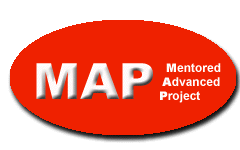
Please refer to http://www.grinnell.edu/offices/dean/map)
What is a MAP?
Four Points
| Clarification | Why MAP?
Why Is A Culminating Academic Experience A Good Idea?
The idea that a culminating academic experience for our students would be a good idea started with the faculty in the late 1980s and early 1990s, when we discussed the introduction of senior seminars. That initiative never got off the ground for a variety of reasons, among which were questions about the financial support that would be available for such an initiative. In the summer of 1998, several groups of faculty got together in FFE workshops to explore the ideas of advanced seminars, which could take several forms, and other types of educational experiences. What faculty were responding to in both cases, as was evident in our discussions, was a sense that Grinnell students often "meandered" through courses in their final year or two. Earlier that summer, a faculty workshop on transcript analysis, conducted as part of our NCA accreditation process, came to some similar conclusions about what appeared to be, in the worst cases, students who graduated with a major and a bunch of courses. Those of us who have had many occasions to visit with Grinnell graduates have heard from them either that they regret not having had a major project while undergraduates here or, if they did, that such a project was a highlight of their Grinnell experience. Finally, in conversations with the consultants who were helping us redesign our Viewbook, faculty spoke of the value in students' academic experiences of initiative and independence, of meeting a challenge, of carrying a project to completion, and of the self-confidence that comes with accomplishment.
In different ways, then, each of the conversations we've briefly summarized here pointed in the direction of our offering to interested students an opportunity to undertake an advanced academic experience that would bring together previous experience and allow them to undertake a substantial independent project. We are, in a word, hoping to change the academic experience of our students, both those who engage in such projects and those who, by learning about them, indirectly benefit from them.
What Needs Does the Proposal Address?
We know, of course, that some Grinnell students already have such experiences. Many of the extended summer research projects that some science majors undertake, for instance, provide the opportunity for such an experience. Other independent research projects, some concentration senior projects, and some department seminars may also fit. However, setting aside teaching that is part of a faculty member's five-course load, what seems to characterize much of this sort of experience is that it has been an "overload." What also seems to characterize the current independent activities in which students can engage is that they have proliferated and that the various kinds do not necessarily share many points of similarity.
Indeed, we appear to have what one faculty member characterized as a "Pandora's box" of proliferating and quite different possibilities for student independent work, few of which are credited as part of a teaching workload. Our proposal tries to address both of these problems. We're first of all trying to give a common definition to some of this independent work. Possible benefits of such definition would be that independent work might gain more visibility and that individual faculty might shift their efforts away from such a multiplicity of plus-2s, guided readings, independents, internship supervision, etc.. A further benefit would be that by giving the various forms of this independent work a common definition, it becomes possible to give faculty credit for directing them. The problem of lack of credit concerned a faculty group in a FFE workshop during the summer of 1998, and it worked particularly on trying to create a system that would take a wider array of faculty teaching into account. Our proposal picks up on this idea and includes a crediting system for faculty working on these advanced academic experiences beyond their five-course load.
This proposal also expands the opportunities for advanced projects beyond what is currently done and thereby addresses another need that was expressed in some of the divisions and in the faculty forums: the lack of opportunity to do interdisciplinary work at an advanced level. Expanding the opportunities currently available to allow advanced interdisciplinary or interdepartmental seminar projects also represents the direction in which the organization of knowledge in several disciplines has moved. The development of opportunities to do advanced interdisciplinary work might also play a part in the attraction and retention of faculty, especially in the Humanities and Social Sciences. We recognize that the advanced interdisciplinary seminars that would provide the context for these advanced academic projects may present more difficulties in implementation than advanced research projects for individual students do, but we believe they should be actively promoted.
Finally, the proposal addresses a concern expressed in at least one division: "equity" for students. Often a relatively small group of "elite" students benefit substantially from the opportunity to do independent work, while others appear less likely to take advantage of such opportunities. We hope that our proposal, by offering definition to these opportunities, would make them more visible to students and, by broadening the kinds of activities included under the definition, would make advanced independent work available to a wider range of students.
This statement was approved by the Grinnell College faculty on April 17, 2000.